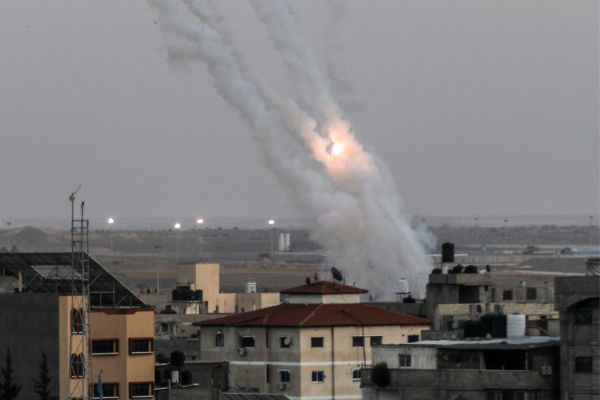Researchers from Tel Aviv University find that wellbeing decreases as proximity of residence to Gaza rocket attacks increases.
By Ben Rappaport, United with Israel
Israelis’ psychological and physical wellbeing decreases as proximity of residence to Gaza rocket attacks increases, researchers at Tel Aviv University found.
The findings were published in the peer-reviewed journal Communication Medicine from the Nature group.
The researchers based their conclusions on the reactions of a sample group of Israelis to the periods immediately before, during, and after the May 2021 war between Israel and Hamas terrorists.
“We prospectively monitored 954 Israelis (>40 years) from two weeks before the May 2021 Israel-Gaza war until four weeks after the ceasefire using smartwatches and a dedicated mobile application with daily questionnaires on wellbeing,” the researchers wrote.
“Wellbeing indicators” were defined as “mental (screen-on time, mood level, stress level, and the number of social encounters), energy expenditure (step count, average heart rate, percentage of time still, and sport time), and sleep (awake time during night sleep, sleep start hour, sleep duration, and sleep quality).”
They said they noticed “considerable changes in all the examined wellbeing indicators during missile attacks and throughout the war, including spikes in heart rate levels, excessive screen-on time, and a reduction in sleep duration and quality.”
“These changes, however, fade shortly after the war, with all affected measures returning to baseline in nearly all the participants.
“Greater changes are observed in individuals living closer to the battlefield, women, and younger individuals,” the researchers added.
While all the indicators were found to have worsened during the war, the researchers noted the “resilience” of Israeli civilians in their ability to “bounce back” afterward.
“[As] quick as the effects of the war were, so was the recovery, with all the measures that were altered during the war period returning approximately back to normal within 2 weeks after the cease-fire date.”
In addition, the wellbeing of residents who lived near Gaza was found to be most negatively affected by the rocket attacks, with the effects decreasing as proximity of residence to Gaza increased.
“We found that individuals residing in areas with high exposure to missile attacks (less than 60 km from Gaza) had significantly stronger effects than individuals with medium exposure (between 60 and 110 km from Gaza), while individuals residing in areas with low or no exposure (more than 110 km from Gaza, i.e., out of the Gaza missile range) showed no significant response to the war other than an increase in screen-on time.”
The study was conducted by Tel Aviv University Associate Professor Erez Shmueli and Professor Dan Yamin of the Big Data Lab; doctoral students Merav Mofaz and Matan Yechezkel of the Fleischman Faculty of Engineering; Professor Noga Kronfeld-Schor of the Wise Faculty of Life Sciences; and Professor Haim Einat of the Academic College of Tel Aviv-Yafo.
“Today, wars are fought deep within the country so monitoring the resilience of individuals and groups is crucial,” Shmueli said, according to the Jerusalem Post. “The state needs to know what happens to its citizens during war and provide special support to groups that are more prone to harm.”
“In further research, it will be important to identify individuals who suffered significantly during the war and did not return to normal after it ended,” he added.
